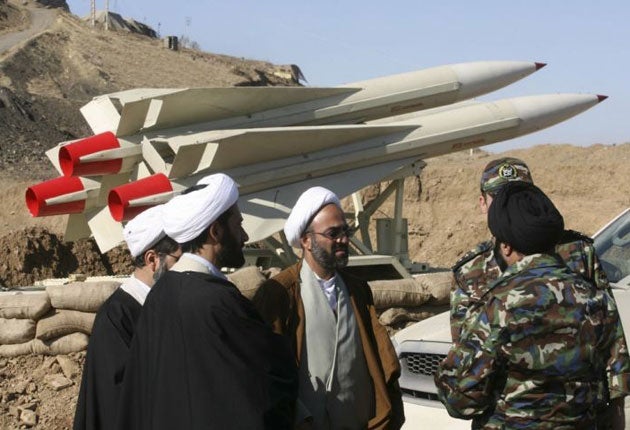Iran hangs man accused of passing military secrets to Israel
Alleged Mossad agent was said to have leaked information, including details of missile programme, on 'foreign trade' trips

Iran yesterday hanged a man accused of spying on the country's military apparatus for the Israeli intelligence agency Mossad.
The Iranian judiciary announced through the official IRNA news agency that Ali Akbar Siadat had been executed at Tehran's Evin Prison after being found guilty of passing on information, including details of the missile programme of the Islamic Revolutionary Guards.
According to an official list of charges, which included accusations of "spreading corruption on earth" and "supporting the Zionist regime", Mr Siadat was repeatedly paid up to $7,000 (£4,555) a time for meetings with Israeli agents abroad between 2004 and his arrest in 2008. IRNA claimed that he had also confessed to being paid an initial $60,000 to begin a career in espionage during which he transferred data to the agents on "foreign trade" trips to Turkey, Thailand and the Netherlands with a digital camera, transmitters and a laptop.
The classified information was said to have included details of military manoeuvres, bases, operational military jet fighters, air crashes and missiles. Earlier this week, Iran's judiciary announced that a spy for Israel would be executed soon after confirmation by an appeals court of his death sentence. That statement said that the defendant's lawyer had been present at the trial.
Iran periodically reports the arrest of citizens accused of spying for Israel. But Mr Siadat, who was named by opposition Iranian websites earlier this year as one of 192 political prisoners held by the authorities, is the first known Iranian to be executed on charges of spying for Israel since November 2008.
Ali Ashtari, a communications and security equipment salesman, was hanged two years ago after being convicted of passing information to Israeli agents, including data on the nuclear programme which Israel and the Western powers are convinced is being developed for military use. Neither Israel nor the US has ruled out the use of military force if the current, tightened, sanctions regime fails to forestall Iran's perceived military nuclear ambitions.
Ten years ago, 10 Jewish Iranians were convicted of spying for Israel in a trial behind closed doors and sentenced to jail terms of between four to 13 years. But the men were all released before serving their full sentences thanks to international pressure.
A second man was hanged in Iran yesterday for supporting an exiled opposition group. Ali Saremi, who has been repeatedly convicted since the Seventies for support of Mujahedin-e Khalq [MEK], a group which opposed both the US-backed Shah and the current Iranian cleric-led regime which replaced him in the Islamic revolution of 1979.
The regime has repeatedly accused the exiled MEK – also known as PMOI or the People's Mujahedin of Iran – of being behind militant attacks against it from bases in Iraq and Europe.
Last August, Amnesty Intenational said that Mr Saremi, 62, had visited a son in MEK's Camp Ashraf in Iraq and that he had spent a total of 23 years in prison both before and after the 1979 Revolution. IRNA said yesterday that Mr Saremi had been arrested several times since 1982 for membership of the group – which was also named as a "terrorist organisation" by the US State Department in 1997 – but had always continued his activities. It added that he had been hanged for a series of offences including "moharabe" or "waging war against God".
The MEK said in a statement yesterday that Mr Saremi's wife and daughter and two other supporters had been arrested while protesting outside Evin Prison after his execution.
It said that, while he had been arrested in 2007, the death sentence on him was passed after the mass opposition protests against the regime in December 2009. Amnesty has said that six other people are currently in Iranian prisons facing death sentences for alleged MEK links.
Maryam Rajavi, leader of the Paris-based National Council of Resistance of Iran, said that Mr Saremi's execution "only reflects the regime's inability and frustration in face of the resolute Iranian youths and members of PMOI who are determined to overthrow clerical rule and establish freedom and the rule of the people in Iran".
It added that Mr Saremi had been subjected to the "most brutal torture and pressures" until his final days.
Meanwhile Iran's President Mahmoud Ahmadinijad said in a live television broadcast that the Western powers' "hostile" policies could damage the chances of fresh talks on the nuclear programme planned in Istanbul later this month. "If you take an action that is a continuation of the previous path, this will make the job difficult. It will close the road [to dialogue]," he said.
Subscribe to Independent Premium to bookmark this article
Want to bookmark your favourite articles and stories to read or reference later? Start your Independent Premium subscription today.

Join our commenting forum
Join thought-provoking conversations, follow other Independent readers and see their replies